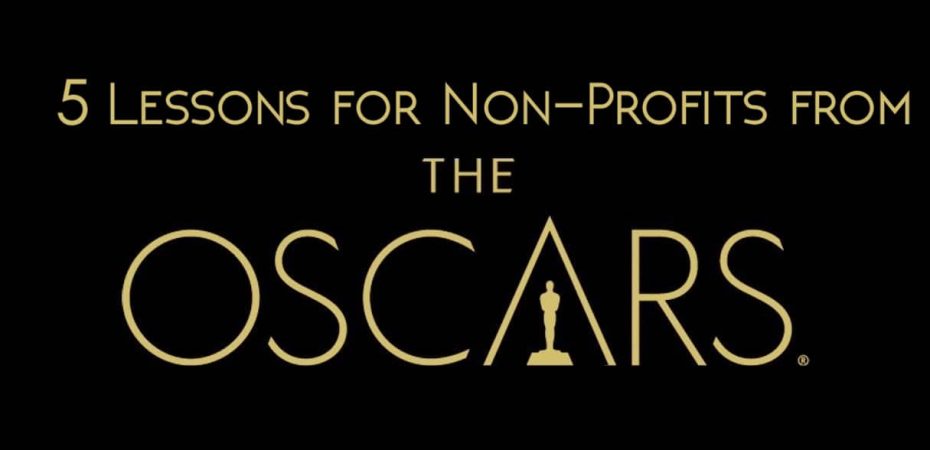Written by Lindsay Long, Account Director
As Hollywood celebrated the achievements of its best and brightest on Sunday, we weren’t merely bowled over by amazing performances and haute couture fashions. No, as committed advocates for charitable work, we found ourselves inspired by strong statements for equality and social justice that were issued by the winners. We couldn’t help but wonder, what other lessons might we take away from the ceremony?
1. Attention is power.
In Best Picture winner Birdman, Michael Keaton goes unexpectedly viral after a video is shared of him running through Times Square in nothing but his skivvies. Embarrassing? You bet. But, film daughter Emma Stone has a different view: “Believe it or not, this is power.”
Non-profits often focus heavily on programs and service delivery—and rightfully so, with so many constituencies out there in need of support. But, we can be at our strongest when we have the proverbial stage and microphone to trumpet our missions, and we simply can’t afford, for the long-term health of our programs, to let communications investments fall by the wayside.
It’s a crowded market, and we need to fight for attention. When we have it, follow in the footsteps of Oscar winners like Patricia Arquette, who won Best Supporting Actress for her performance in Boyhood, by inspiring people with a message that urges them to leap to their feet and join a cause. Who knows, you may just find that Meryl Streep and Jennifer Lopez are also on your side!
2. Against all odds: STAY WEIRD! And never forget that there are plenty of people out there struggling against the odds who need our support.
Everyone loves seeing a completely unexpected winner, and the genuine surprise and joy of The Imitation Game screenwriter Graham Moore was a delight. He went one step further with his heartfelt speech, imploring us all to “stay weird. Stay different. And when it’s your turn to stand on this stage, pass the message along.”
Moore was open and honest about his struggles as a youth—shockingly open and frank for such a short speech. But, he reminded us how difficult life can be when you feel isolated or down on your luck, or if you are staring straight into the face of hardship.
His was not the only moment of such honesty that reminded us how important non-profits can be by providing comfort to those in need, and how much that support can mean for someone who feels up against the ropes. Take this moment as an inspiration to double down on your efforts, and imagine what future possibilities may be in store!
3. Breathtaking visuals can help us tell incredible stories—and help donors experience programs in entirely new ways.
One through-line in the Oscar ceremony was the significant design achievement of The Grand Budapest Hotel, by Wes Anderson—a director known for his deep involvement at all levels to achieve visual harmony in his films.
As Wes Anderson created a world in which we could taste Mendl’s chocolates melting in our mouths, we must ask: How can we communicate with our supporters so they feel like integral members of our teams and stories?
Often, gifts to an organization are surrogates for individuals who wish they could be enacting these charitable programs themselves—but who lack the time or training to do so. We must work to transplant donors out of their chairs and into the field, and visual storytelling is one of the most potent weapons in our arsenal to do so.
4. #AskHerMore reminds us that one dimensional communications work for no one.
Reese Witherspoon was one of the leading advocates for the #AskHerMore campaign ahead of this year’s Oscar ceremony, demanding that women on the red carpet be asked more interesting and creative questions than, “Who are you wearing?”
This was a campaign borne of frustration that the perceived value of women in Hollywood ended at their fashion statements, when these women have multi-faceted personalities, experiences and inspirations that are relevant to their work and presence at the Academy Awards.
In the same way, donors get tired of seeing their perceived value end at their pocketbooks. How often are you communicating with your donors outside of asking for a gift? If you don’t take the time to diversify your communications and treat your donors as more than walking dollar signs, it is only a matter of time before they shut you off.
5. When someone helps you achieve something great, by golly, you better thank them!
There’s nothing like an awards show to remind us of the importance of gratitude—the director, the cast, the agent, the Academy. Better not forget your spouse! Or else that limo ride home might be a bit frosty…
In all seriousness, the winners on Oscar night recognized the important role that other people played in their success, because no one achieves such great heights all alone. In the same way, non-profits are only successful because of the continued support of loyal donors who believe in their missions. Sometimes, it can be easy to forget that, particularly if gifts are coming in from far away through the mail or online.
Donors want to feel like part of your family, and that their support is important enough to you to be singled out with special thanks. If you withhold or neglect that gratitude, you won’t have to suffer through an icy car ride home, but you may find that you are frozen out of their charitable planning in the future.
These are just some of the discussions our team is having around the water cooler today… have any to add?




